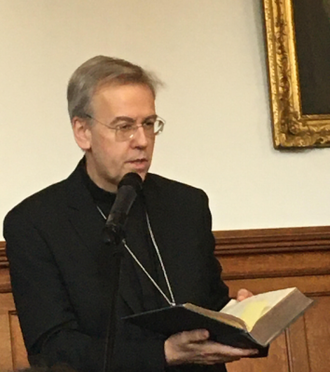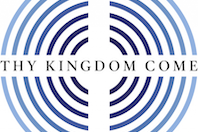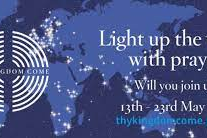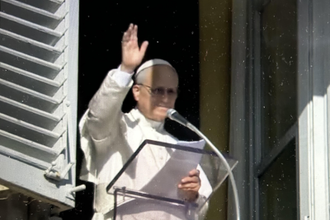Bishop Nicholas Hudson at Lambeth Palace Thy Kingdom Come 2020 event

Bishop Nicholas Hudson
On Wednesday, 25th February 2020, Bishop Nicholas Hudson delivered the following address at Lambeth Palace during a pre-launch event for Thy Kingdom Come 2020, an annual ecumenical and global prayer movement which takes place for 11 days from Ascension to Pentecost. In his reflection, Bishop Nicholas focused on John 20:19-31, a scripture passage which includes Jesus appearing to his disciples and Jesus appearing to Thomas. The full text follows.
I've been to the Upper Room, or at least to the Medieval chamber built on what is held to be the site of the Upper Room. Many of you will have been there too. I had the privilege of spending an hour there alone recently. How I prayed! You can imagine, I wanted to pray about everything and for everything; about everyone and for everyone! For my family and friends; for the Church and the Churches; for all the people of the world; for those who know Jesus; for those who seek to know Jesus; and, in a special way, for those who are indifferent.
I sought, in my very inadequate way, to unite myself to all that had happened in that place: to Jesus's giving of himself, giving of his very body and blood there, the night before he died; to all that happened there afterwards; to the disciples gathered there with Mary in the days after his death, the doors closed, for fear of the Jews; to his coming among them to say, 'Peace be with you'; to Thomas's doubting and then touching his wounds; to Jesus's breathing upon them the gift of the Spirit; his telling them, 'Receive the Holy Spirit. For those whose sins you forgive, they are forgiven.' Ah, the Spirit; first bestowed in that place; and whose power has coursed along the veins of Christ's body the Church down through twenty centuries to today! I found myself wanting to rest there in the Spirit; simply asking the Spirit to renew in me the gift of himself; in me, in the Church, in the world.
There, from that Room, your mind can't help but reach out to what's beyond it. You feel you're at the centre of the world. And in a sense you are. Because you're on Mount Zion. The words of the author of the Letter to the Hebrews, 'What you have come to is Mount Zion, the city of the living God', reverberate within you. Across the valley stands the Mount of Olives; just across the Kidron Valley, yes, the valley Jesus walked across to meet his destiny. Amazingly, you can see the very steps, Roman steps, he will have walked down and which he was led back up after his arrest as the soldiers led him to the house of Caiaphas. Golgotha stands less than half a kilometre away. All of this, you hold in your heart. Lingering there it gives a taste, the smallest taste, of how much Jesus held in his heart, how his heart must have been close to bursting with pain and sadness and fear but also joy and expectation, in that very place. You feel the depth of his lament, 'Jerusalem, Jerusalem,' which he made as he looked out over the city, 'how often I have longed to gather your children'. Pain but also joy at the knowledge that the Spirit would be coming; and coming first in that Upper Room.
As I stayed with this text in preparation for today, I found myself, as I say, transported in prayer back to that place. But I was also transported to this place, this upper room where I knew we would be gathering as Christians today here in the heart of London. And in my mind's eye, or, better, my heart's eye, I found myself imagining all that is going on outside of this place too: the countless people cycling and running and driving and walking over Lambeth Bridge, milling indeed across Millbank in all directions. And it came to me how much Jesus and the Sprit must yearn for the heart of each one; yearn to tell them that he died for each one of them.
There came to me forcibly words of Thomas Merton, which I find myself often recalling as I contemplate the throngs of London commuters, words he titled, 'Conjectures of a Guilty Bystander'. They will be familiar to many of you: 'In Louisville, at the corner of Fourth and Walnut', he wrote, 'in the Center of the shopping district, I was suddenly overwhelmed with the realisation that I loved these people, that they were mine, and I theirs, that we could not be alien to one another even though we were total strangers. It was like waking from a dream.' 'I was suddenly overwhelmed with the realisation that I loved these people, that they were mine, and I theirs, that we could not be alien to one another even though we were total strangers.'
I don't know if you've ever experienced anything like that. Of love for a mass of people you don't even know. I have. I experience it most often in the crowded intimacy of the Underground when I look around at the faces of everyone in the carriage and think to myself, 'Isn't it extraordinary that Jesus knows the name of each one here; and wants each one of them to know him as their Saviour?!' I begin to feel something of his love for them; and I pray for them; pray the Holy Spirit to speak to the heart of each one of them.
Even before we launch Thy Kingdom Come, I'd like to suggest we can be praying here today from this Upper Room for all the people going about their daily lives all around us, close by Lambeth Palace, across the river, across London, across the nation, across the nations, to the other side of the world, whether waking or sleeping, that the Holy Spirit speak to their hearts. Of what? Of the loving sacrifice that Jesus worked for them in Jerusalem two thousand years ago. Begin to pray now that, in the days between Ascension and Pentecost, their hearts be open to the influx of the Spirit as Christians of so many denominations call him down into the heart of every man, woman and child.
Of course, many in our society doubt. Thomas doubted. It was only when he could place his finger into the side and hands and feet of Jesus that he felt he could believe. Christ's wounds are still to be found on show, mercifully, still allowed to be seen, all around us: here around our necks, in crucifixes and paintings and statues across so many countries of the world. Part of what we pray as we call on the Holy Spirit in the time leading up to Pentecost might be that we pray that the Spirit give people the desire to touch those wounds. I have a friend who came to know Jesus as a young man in his late twenties. He'd been raised a Buddhist. He says it was only when a Christian friend explained to him that Jesus had died FOR HIM, not just for others but for him, that he came to faith. Only then, he says, did he notice the wounds which remain in the body of the Risen Lord. This captures the essence, surely, of what we're about: praying that the Holy Spirit help people know that Christ died for them; that by his wounds they are healed.
But we need to remember, this is no passive process. It's not only about praying. As he gave them the Spirit, he also sent them. 'As the Father has sent me, so am I sending you', he told them. 'Receive the Holy Spirit'. Communion is for mission. So we're being called not just to pray but to pray for the grace to tell others that Jesus died for them; and to show them his wounds by touching their wounds. Touching their wounds? Well, yes, and here's the mysterious part because, as Pope Francis tells, it's when we touch the wounded flesh of others that we touch the wounded Body of Christ. Put your hand into their side and you're putting your hand into Christ's.


















